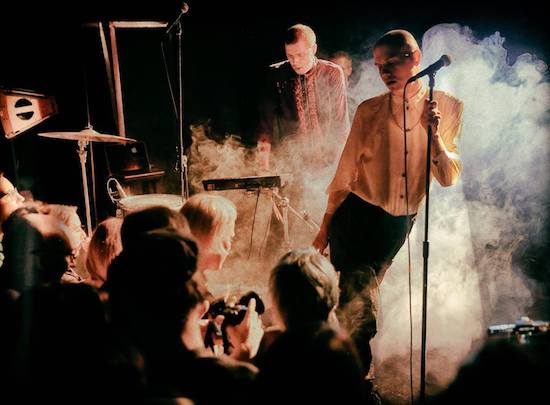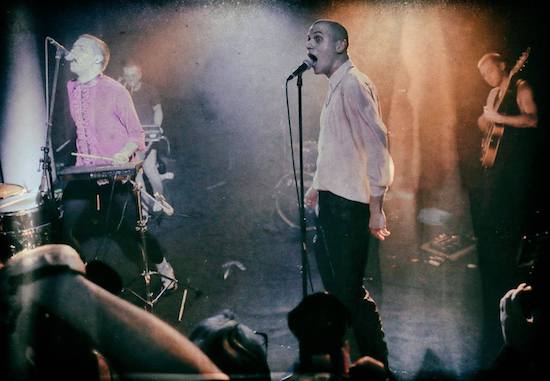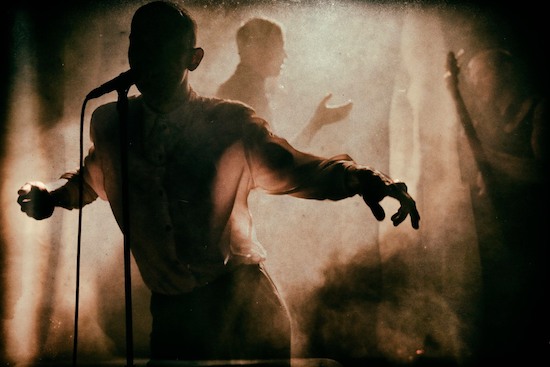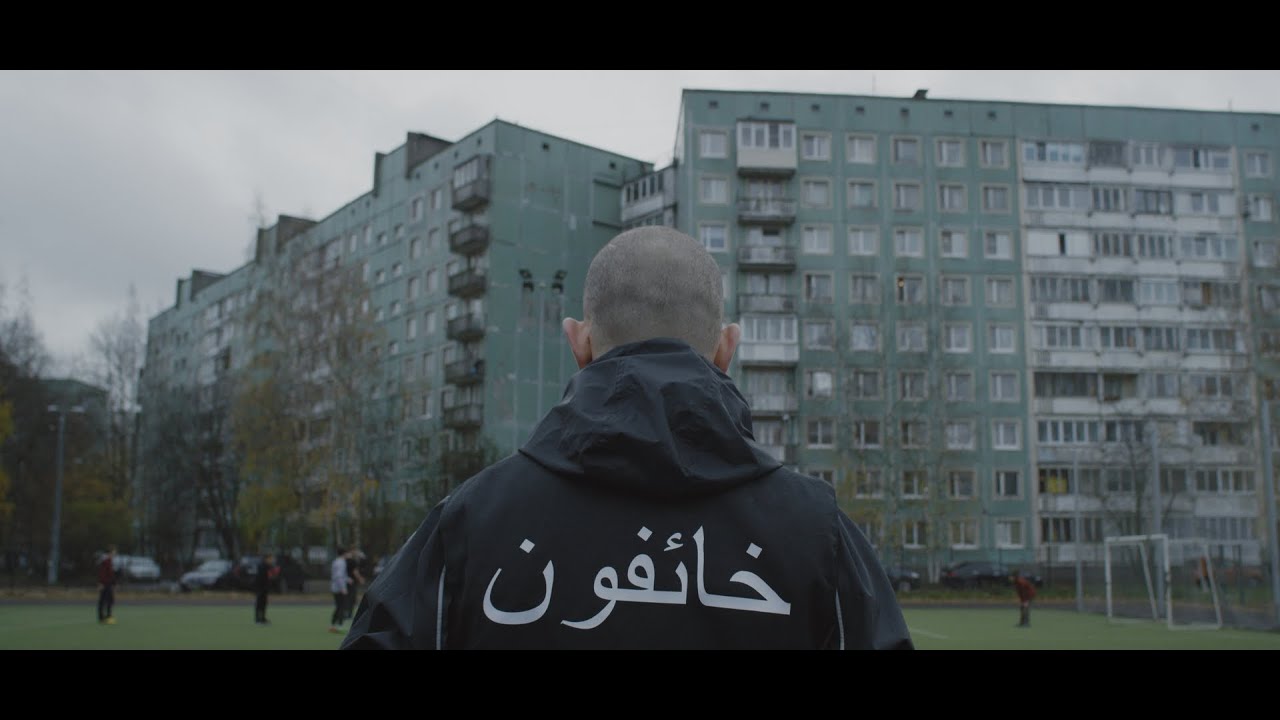All photographs courtesy of Marius Morkevičius
We know that Shortparis is Nikolai Komiagin (vocals), Danila Kholodkov (drums and percussion), Aleksandr Galianov (guitar, synths) Aleksandr Ionin (bass), Pavel Lesnikov (drums). But is Shortparis a rock band, or theatre?
Collective band statement #1: "If theatre is a synthesis of arts, then we are not theatre, and we avoid it. Things such as choreography or design, it is all unconscious with us. It comes from music, and music always comes first."
One thing this writer can say with confidence is that Shortparis is a sensational band; a perfect marriage of the thoughtful and the visceral. Formed in gloomy, romantic St Petersburg, Shortparis seem “made for the big stage”. As a live act, however, Shortparis often (violently) react against the idea of the stage as a predetermined, fixed space to present a show, and don’t care much for crowd pleasing either. In short, a supremely entertaining proposition who have problems with traditional concepts of entertainment.
Collective band statement #2: "This is well said, thank you. We think of it like this; the stage is where we can put our instruments, turn them on, and play. But it does not mean that we ignore the actual environment."
Used to the vagaries of what passes for an alternative circuit in their native land, Shortparis is supremely adaptable to circumstance. Adversity and altercation ride pillion with the band, and sometimes act as unwitting best friends. Playing a ridiculously early set at Station Narva festival for example, the group seized the opportunity to blast the sparse early crowd with an epic display of New Beat bombast. Other (personal) live highlights include a feral gig in a sweaty squat club at MENT festival in Ljubljana, where singer Nikolay waded into the crowd looking for his own – artistic – form of aggro. The existential cool of both WORM, Rotterdam and OCCII, Amsterdam was shaken by two wild extravaganzas that were equal parts punk floorshow and big top lion-taming. Both onstage eruptions driven by hours-long misunderstandings with normally laid-back production staff.
Is Shortparis the Modern Dance?
Collective band statement #3: “No. But we are not a typical rock band.”

The band draw from many creative worlds, and often react against what they were taught. When asked about their links to forms of dance by this website before their show in WORM, Nikolay responded: “Because I was teaching and studying dancing for two years, I got used to it and don’t want this anymore. I hate professional dancing and dancers. I am not interested by modern dancers. I really hate Russian ballet and I really don’t like this aspect of Russian culture. For me I like the movement on stage of punk rockers. Not because they had different interpretations of being pathetic [sic] but they have raw power. Most of all I like Iggy Pop, because it’s just a kind of truth I think. It is plastic and dangerous and a beautiful modern dance.”
How, then, do Shortparis construct their music?
Collective band statement #4: “When we start a new track, we see some ‘eidos’ of it, some essence, though it is indistinct and unclear. And construction is a selection, sorting out from different forms that we can produce as musicians; such as riffs, rhythms, composition. And we keep doing it, until this process leads us to the closest expression of the idea that came first.”
Despite all the bombast and direct feel of their music, the rhythms can be very complex; full of clever counter rhythms and spaces of tension.
Collective band statement #5: “The music of Shortparis is dual. Harmony is close to dissonance, the straight kick drum can turn into polyrhythmic riffs. We always say that a beautiful pop melody must be always disturbed by something. It is our principle, that is what maybe creates the tension.”
Ah yes, creative tension… Which leads us on to one of the most intriguing aspects of the band: their lyrics and communication strategies. Like the line in Mayakovsky’s Past One O’Clock, Shortparis know the power of words – and their tocsin [sic]. But, rather than use words to bare their soul like the fated poet, the band play linguistic games to tease. Shortparis earlier told this website about a triple communication method, namely White, Red and Black information. Whether they employ it though is open to question. They may like the legendary Petersburg prankster Sergei Kuryokhin, or they may not. Myths abound. They have recorded their suggestive, hyperintense music in three languages (French, English and Russian). The latest video, ‘Scary’ is littered with texts, scripts and symbols. There is a clear message in all of this, somewhere.
A Siberian friend recently told me their Russian-language songs are “so sad”. But when asked about the emotional content of their texts, the answer was faintly dismissive. “We speak about our culture and meet with others. But we like the absurd. We wrote a song, ‘My Russia’ in French. For most people this is an absurd act, and it means nothing. No-one in Russia understands French. So for us language is an instrument. Sometimes it is an empty subject. It means everything and nothing, an art act.”
Conversations with Shortparis can be labyrinthine, intriguing. They are actually great company, however, a bunch of generous, intelligent and accommodating souls; but also mercurial and prone to sudden bouts of philosophising. Sitting on the bridge overlooking the huge Kreenholm mill complex (a Tsarist mini cottonopolis, built with the help of Lancastrian millworkers) after their splenetic performance at Station Narva, talk with Alexandr, Nikolay and Pavel quickly turned from where best to cop some beer and smokes to defining the differences between Imperial evil and colonial evil. Interviews with them often hint to a friction formed by their ideas round place; where they find themselves in the world and where they came from, and what to hide, or what to show in the appropriate setting.
Collective band statement #6: “Shortparis is a Russian group. Russia has borders both in Europe and Asia, and Russia is a space for dialogue. We cannot ignore it, we reflect it. Three original members of the band are from Siberia, Novokuznetsk, and other two are from St Petersburg. Novokuznetsk is closer to China and Mongolia than to St Petersburg, or even Moscow. We think of “Siberia” as something primal and savage, but this energy found its form in the most European city in Russia. St Petersburg, with its classical and strict spirit, structured this primal energy, and formed it.”

Before the show at WORM, the band were keen to emphasise the effect their twin hometowns of St Petersburg and Novokuznetsk – specifically Novokuznetsk – had. Nikolay: “We never talk from the stage with people. But sometimes I speak about Novokuznetsk and this word has a specific, authentic power for me. One word is like a manifesto. It is very important.”
This manifesto is maybe there to emphasise the band members’ belief that there are “two Russias, Moscow and St Petersburg and the other cities”. The band all paint Novokuznetsk as a tough place, one of a number of heavily industrial provincial cities that experienced rapid growth in late Tsarist times. Alexandr joked it was “maybe like Manchester but from five thousand years ago”. Picture a band, then, driven by a “symbol of brutal Russian truth”; an industrial city surrounded by forest and affected by severe weather and high poverty and pollution levels. Such conditions have an adverse effect on people. And the band have consequently experienced a range of prejudices. But Nikolay nevertheless sees this social friction as a problem that is “interesting to work with”. After all, avoiding the “crazy redneck” locals led to the legendary story of the (axe/hammer wielding) band members meeting. And in the end Shortparis’s music can somehow make Nikolay’s “dream” that “we can understand together” happen. Maybe a dream that has been given a kick (forgive me) by 2018’s World Cup. Shortparis followed the World Cup in Russia closely, and played gigs in the Petersburg fanzones. These fanzones, and the clash of cultures they hosted, were soaked up by the band who saw them as engines for new and exciting creative dialogues.
In conclusion …
“No, I will not, I cannot cross this border of the kingdom of darkness, of arbitrariness, of silent agony, of solitary death, of gagged suffering…” Russian dissident writer Alexander Herzen’s lines, written after the failed 1848 revolutions in the West, may still colour how we see Russia, and maybe even the likes of Shortparis. The myth of the Russian bear is still strong. And perceptions often cause friction for Shortparis, who state “national identification is important for us.” There was a recent pre-gig contretemps over Nikolay wearing a teeshirt with Russian flag in Nuremberg, for example. Still, on the ground, matters are often radically different. Alexandr: “With everyone we come across, when we say we’re from Russia, we always hear the same reaction; “Oooh cool!” [laughs]. They know that Russia is something strange, something aggressive. I think they don’t know the details of our character and national spirit. Maybe they only know about vodka and drinking. And anyway, everyone wants money, everywhere.”
Do you really have an ikon on the rider? Or is this urban myth?
Collective band statement #7: “We really do.”
Shortparis play across Europe, including their first ever English dates, this May. They play Donau Festival on April 28



